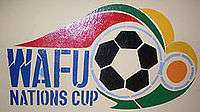WAFU Nations Cup
 | |
| Region | West Africa |
|---|---|
| Number of teams | 8 |
| Current champions |
|
The WAFU Nations Cup (often abbreviated as the WAFU Cup) is an association football competition that is contested by representative teams of the West African Football Union.
A trophy was commissioned by President Gnassingbé Eyadéma of Togo in 1974 with a view to establishing a regional competition similar to the Africa Cup of Nations tournament.[1] The maiden event was hosted in Abidjan and the hosts Ivory Coast won the tournament.
The West African Nations Cup (Zone 3) commenced in 1982 on an annual basis (not in 1985), and was played until 1987. Meanwhile, in 1983 ECOWAS (French:CEDEAO) create another tournament, the CEDEAO Cup (Zone 3) and it was played on a bi-annual basis until 1991.
Zone 2 also had their own tournament created, the Amílcar Cabral Cup, named after the liberator of Guinea-Bissau, Amílcar Cabral.
The West African Nations Cup returned in 2002 as the WAFU Nations Cup, however, officially it was not considered simply as a continuation of the old tournament, and therefore it is a new tournament. The 2002 edition was short-lived after violence broke out in Ivory Coast.[2] Two games of the tournament had been played when it was cancelled. Finally, after an eight-year wait, the tournament returned in April 2010 which Nigeria's Ogun State hosted and the host nation won.
Tournament history
| Year | Host | Final | Third place match | ||||||
|---|---|---|---|---|---|---|---|---|---|
| Winner | Score | Runner-up | Third place | Score | Fourth place | ||||
| 2002 Details |
Abandoned one day into tournament due to the First Ivorian Civil War. | ||||||||
| 2010 Details |
Ogun State |
Nigeria |
2–0 | Senegal |
Ghana |
1–0 | Burkina Faso | ||
| 2011 Details |
Ogun State |
Togo |
3–2 | Nigeria |
Liberia |
3–1 | Ghana | ||
| 2013 Details |
Ghana |
3–1 | Senegal |
Benin |
1–2 | Togo | |||
| 2017 Details |
|||||||||
See also
- UEMOA Tournament
- Amílcar Cabral Cup (a tournament played between 1979 and 2007)
- West African Nations Cup (a tournament played in the 1980s)
- CEDEAO Cup (a tournament played in the 1980s and early 1990s)
References
- ↑ Ibagere, Eniwoke (18 September 2002). "Wafu's bumpy ride". BBC Sport. Retrieved 21 April 2011.
- ↑ "Wafu Cup". BBC Sport. British Broadcasting Corporation. 18 September 2002. Retrieved 21 April 2011.
